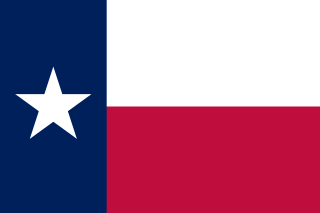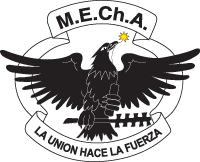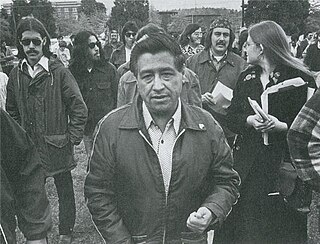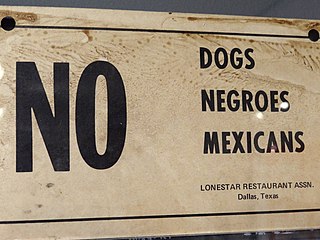
Tejanos are Spanish Creoles from Texas. The term is also sometimes applied to Texans of Mexican descent.

M.E.Ch.A. is a US-based organization that seeks to promote Chicano unity and empowerment through political action. The acronym of the organization's name is the Chicano word mecha, which is the Chicano pronunciation of the English word match and therefore symbolic of a fire or spark; mecha in Spanish means fuse or wick. The motto of MEChA is 'La Union Hace La Fuerza'.

Felix Z. Longoria was an American soldier from Texas, who served in the United States Army as a private. He died during World War II and was buried at Arlington National Cemetery after veterans supported his cause in a dispute over his funerary arrangements.

Hernandez v. Texas, 347 U.S. 475 (1954), was a landmark case, "the first and only Mexican-American civil-rights case heard and decided by the United States Supreme Court during the post-World War II period." In a unanimous ruling, the court held that Mexican Americans and all other nationality groups in the United States have equal protection under the 14th Amendment of the U.S. Constitution. The ruling was written by Chief Justice Earl Warren. This was the first case in which Mexican-American lawyers had appeared before the Supreme Court.

Héctor Pérez García was a Mexican-American physician, surgeon, World War II veteran, civil rights advocate, and founder of the American GI Forum (AGIF). As a result of the national prominence he earned through his work on behalf of Hispanic Americans, he was instrumental in the appointment of Vicente T. Ximenes, a Mexican American and AGIF charter member, to the Equal Employment Opportunity Commission in 1966.

The Chicano Movement, also referred to as El Movimiento, was a social and political movement in the United States that worked to embrace a Chicano/a identity and worldview that combated structural racism, encouraged cultural revitalization, and achieved community empowerment by rejecting assimilation. Chicanos also expressed solidarity and defined their culture through the development of Chicano art during El Movimiento, and stood firm in preserving their religion.

Partido Nacional de La Raza Unida was a Hispanic political party centered on Chicano (Mexican-American) nationalism. It was created in 1970 and became prominent throughout Texas and Southern California. It was started to combat growing inequality and dissatisfaction with the Democratic Party that was typically supported by Mexican-American voters. After its establishment in Texas, the party launched electoral campaigns in Colorado, Arizona, New Mexico, and California, though it only secured official party status for statewide races in Texas. It did poorly in the 1978 Texas elections and dissolved when leaders and members dropped out.

John James Herrera was an American attorney, activist, and leader in the Chicano Movement.
Gustavo "Gus" C. Garcia was an American civil rights attorney. Garcia worked with fellow attorney Carlos Cadena in the landmark case Hernández v. Texas (1954), arguing before the US Supreme Court for the end of a practice of systematic exclusion of Hispanics from jury service in Jackson County, Texas. Even though Mexican Americans composed more than 10% of the county's population, no person of Mexican ancestry had served on a jury there and in 70 other Texas counties in over 25 years. The high court, led by Chief Justice Earl Warren, ruled that United States citizens could not be excluded from jury duty based on national origin, because such exclusion denied the accused a jury of his peers.

The Mexican American Youth Organization is a civil rights organization formed in 1967 in San Antonio, Texas, USA to fight for Mexican-American rights. The creators of MAYO, Los Cinco, consisted of José Ángel Gutiérrez, Willie Velásquez, Mario Compean, Ignacio Pérez, and Juan Patlán. MAYO and its political organization, Raza Unida Party, played an important part in Texas history during the late 1960s and early 1970s. They were a part of the larger Chicano movement in the United States, and played a role in bringing about civil rights for Mexican-Americans.

Anti-Mexican sentiment, is prejudice, fear, or hatred towards Mexico and people of Mexican descent, Mexican culture and/or Mexican Spanish and it is most commonly found in the United States.

The League of United Latin American Citizens (LULAC) is the largest and oldest Hispanic and Latin-American civil rights organization in the United States. It was established on February 17, 1929, in Corpus Christi, Texas, largely by Hispanics returning from World War I who sought to end ethnic discrimination against Latinos in the United States. The goal of LULAC is to advance the economic condition, educational attainment, political influence, housing, health, and civil rights of Hispanic people in the United States. LULAC uses nationwide councils and group community organizations to achieve all these goals. LULAC has about 132,000 members in the United States.

Vicente T. Ximenes was an American civil servant active in advocating for the civil rights of Mexican Americans.
The Political Association of Spanish-Speaking Organizations (PASSO) was formed as an outgrowth of the success of the Viva Kennedy Clubs in the 1960 United States Presidential Election. PASSO, which comprised several Mexican-American activist groups, fought to increase Mexican-American participation in electoral politics and campaigned for candidates, generally of Mexican descent, who supported desegregated education, protection from discrimination and federal government jobs for Mexican Americans. Later, the group became involved in farm labor disputes and was ultimately disbanded.
The Viva Kennedy Campaign was a Mexican-American outreach program run by the presidential campaign of Senator John F. Kennedy from 1959 to 1963. The campaign functioned in the format of clubs networked across the Southwest, working to register Latino voters and increase the Latino turnout for Kennedy in the 1960 Presidential election against Richard Nixon.
The following is a timeline of Latino civil rights in the United States.

Mexican American Women's National Association, known today as MANA, A National Latina Organization, advocates for equality and empowers Latinas through leadership development. MANA was founded in 1974, making it one of the oldest active Mexican-American advocacy organizations, and as of 2000, it is considered the largest Latina organization in the United States. The organization was formed to address the intersection of Mexican-American and women's needs for equal rights. The founders created MANA with the intent of having a Latina-oriented organization. MANA publicizes and addresses Latina perspectives and needs through Social movements, Leadership education, and Advocacy within federal, state, and local governments. They have been involved with multiple major social movements throughout their history. These include advocating for the Equal Rights Amendment and Reproductive rights, as well as social movements on education, leadership development, women's healthcare, and racial discrimination in the work. MANA currently operates from its home base in Washington, D.C., and has local chapters across the nation.

Cynthia Ann Orozco is a professor of history and humanities at Eastern New Mexico University known for her work establishing the field of Chicana studies.

Delgado V. Bastrop Independent School District was a Federal Circuit court case based out of Bastrop county that ruled against the segregation of Mexican-Americans in the public schools of Texas. The court's decision was argued on the standpoint of the Mendez et al. v. Westminster et al. court case and lack of Texas law for segregation of those of Mexican descent, and also stated that Mexican-Americans were separate from African-Americans as had been ruled in Plessy v. Ferguson. This case stated that except for the instance of separating individuals based on severe language difficulties in first grade, the school districts could not segregate their schools between Anglos and Mexican-Americans; moreover, the local school leaders and districts needed to take active action against it or they would also be liable for the results of segregated education. Though this case helped establish a baseline in the law against Mexican-American segregation in public schools, it took many more years and future lawsuits for action to follow through with the actual rulings of the court.














